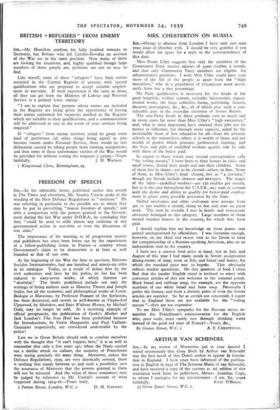FREEDOM OF SPEECH
SIR,—In his admirable letter, published earlier this month in The Times and elsewhere, Mr. Stanley Unwin spoke of the wording of the New Defence Regulations as " ominous." He was referring in particular to the possible use to which they may be put in preventing " honest freedom of speech," and after a comparison with the powers granted to the Govern- ment during the last War under D.O.R.A., he concluded that they " could be used to stifle almost any criticism of any governmental action in war-time or even the discussion of war aims."
The importance of his warning to all progressive writers and publishers has since been borne out by the experiences of a fellow-publishing house in France—a country whose Government's claim to be democratic is at least as well founded as that of our own.
At the beginning of the War the firm in question, Editions Sociales Internationales, had one hundred and ninety-six titles in its catalogue. Today, as a result of action first by the civil authorities and later by the police, its list has been reduced to sixty-seven works, of which thirteen are " doubtful." The books prohibited include not only the writings of living authors such as Maurice Thorez and Joseph Stalin, but all the economic and philosophical works of Lenin. Biologie a Marxisme, by Professor Prenant of the Sorbonne, has been destroyed, and novels so well-known as Virgin-Soil Upturned, by Sholokov, and Jews Without Money, by Michael Gold, may no longer be sold. As a crowning example of official perspicacity, the publication of Gorki's Mother and Jack London's The Iron Heel has been prohibited because the Introductions, by Victor Marguerite and Paul Valliant- Couturier respectively, are considered undesirable by the police!
Lest we in Great Britain should seek to comfort ourselves with the thought that " it can't happen here," it is as well to remember that only a few years ago, when the Nazis carried out a similar attack on culture, the majority of Frenchmen were saying precisely the same thing. Moreover, unless the Defence Regulations, 1939, are very drastically revised, there is nothing that stands between us and such a possibility save the assurance of Ministers that the powers granted to them will not be misused. And the value of those assurances may be judged by reference to Mr. Unwin's account of what happened during 1914-18.—Yours truly,
2 Parton Street, London, W.C. r. D. M. GARMAN.




































 Previous page
Previous page